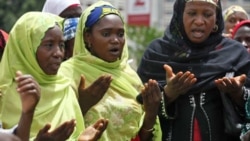“Recent events are confirming . . . the need to understand religious dynamics and engage with religious leaders,” said U.S. Principal Deputy Assistant Secretary for Democracy, Human Rights, and Labor Uzra Zeya. “This is not only about promoting religious freedom but how to advance greater respect and acceptance across faiths.”
Three facts are before us, Ms. Zeya said. First: We live in a religious world, where 84 percent of the world’s population claims a religion. Second: Religious intolerance is on the rise. According to Pew research, the number of countries with religion-related terrorist violence has doubled over the past six years. Third: Religious freedom promotes regional stability.
“[The United States] has emphasized the importance of engaging religious leaders and communities in advancing development, human rights and conflict mitigation,” Ms. Zeya said. “To this end, the [U.S. Department of State] is facilitating engagement involving citizens, faith-based organizations, and governments . . . The Bureau of Democracy, Human Rights and Labor is heavily engaged in interfaith collaboration . . . Our mission is to advance universal human rights and fundamental freedoms and to strengthen democratic institutions in pursuit of a more peaceful, prosperous and stable world.”
“Within the Bureau of Democracy, Human Rights and Labor, we have undertaken a number of initiatives to operationalize religious engagement as part of [U.S.] foreign policy,” she continued. This includes the annual International Religious Freedom Reports, Country of Particular Concern Designations (currently listing Burma, China, Eritrea, Iran, North Korea, Saudi Arabia, Sudan, and Uzbekistan); religious engagement through the Secretary of State’s Strategic Dialogue with Civil Society, launched in 2011; conferences open to government and civil society on religion and foreign policy; sponsorship of interfaith travel; and the Human Rights & Democracy Fund for civil society programs related to religious freedom.
“We all realize the importance of working together to address religious intolerance and the violence and instability it can breed,” Ms. Zeya said in conclusion. “It’s the implementation which presents the greatest challenge. The challenges are significant, but I believe they are surmountable.”
Three facts are before us, Ms. Zeya said. First: We live in a religious world, where 84 percent of the world’s population claims a religion. Second: Religious intolerance is on the rise. According to Pew research, the number of countries with religion-related terrorist violence has doubled over the past six years. Third: Religious freedom promotes regional stability.
“[The United States] has emphasized the importance of engaging religious leaders and communities in advancing development, human rights and conflict mitigation,” Ms. Zeya said. “To this end, the [U.S. Department of State] is facilitating engagement involving citizens, faith-based organizations, and governments . . . The Bureau of Democracy, Human Rights and Labor is heavily engaged in interfaith collaboration . . . Our mission is to advance universal human rights and fundamental freedoms and to strengthen democratic institutions in pursuit of a more peaceful, prosperous and stable world.”
“Within the Bureau of Democracy, Human Rights and Labor, we have undertaken a number of initiatives to operationalize religious engagement as part of [U.S.] foreign policy,” she continued. This includes the annual International Religious Freedom Reports, Country of Particular Concern Designations (currently listing Burma, China, Eritrea, Iran, North Korea, Saudi Arabia, Sudan, and Uzbekistan); religious engagement through the Secretary of State’s Strategic Dialogue with Civil Society, launched in 2011; conferences open to government and civil society on religion and foreign policy; sponsorship of interfaith travel; and the Human Rights & Democracy Fund for civil society programs related to religious freedom.
“We all realize the importance of working together to address religious intolerance and the violence and instability it can breed,” Ms. Zeya said in conclusion. “It’s the implementation which presents the greatest challenge. The challenges are significant, but I believe they are surmountable.”
















